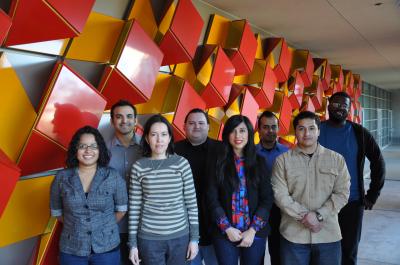ACADEMIA
Fellowships to assist 9 UC Riverside students secure doctoral degrees
Awards aim at increasing the number of ethnically underrepresented students completing doctoral degrees in science, technology, engineering and mathematics
The University of California, Riverside has awarded nine first-year graduate students an annual stipend of $30,000 for two years to increase underrepresented minority students in the fields of Science, Technology, Engineering and Mathematics (STEM) at the doctoral level. In addition to the stipend that covers living expenses, each student's graduate tuition and fees are fully covered.
Funded by a $988,000 two-year training grant from the National Science Foundation (NSF) to the university, the awards are given out by the California Louis Stokes Alliance for Minority Participation Bridge to the Doctorate (CAMP-BD) graduate student activity that is designed to attract underrepresented minority students in STEM disciplines to UC Riverside from not only California but also the rest of the country.
The CAMP-BD activity provides professional development to students to encourage their participation at state and local professional conferences, and assists them in applying to postdoctoral programs.
"The goal of the CAMP-BD awards is to increase the number of ethnically underrepresented students completing STEM doctoral degrees by offering recipients the opportunity to enroll in a graduate degree program without the financial burden typically associated with graduate education," said Rich Cardullo, the lead investigator at UCR of the NSF grant (the principal investigator is UC Irvine Chancellor Michael Drake) and the UCR faculty director of the CAMP program.
Cardullo explained that first-generation students from underrepresented minorities are often subject to much pressure to go to law school, medical school and other professional schools.
"But we also have a strong need for next generation scientists, engineers and educators with Ph.D.s who are underrepresented minorities," he said. "The CAMP-BD awards aim at closing the gap. We awarded six fellowships last quarter. We are pleased to be able to add three more students to the mix this quarter."
The nine students selected for the awards are:
Mackenzie Alvarez (chemistry), Jesse Benavides (mathematics), Carla De Los Santos (bioengineering), Eddie Laguna (chemistry), Abdullah Madany (biomedical sciences), Maricela Maldonado (bioengineering), Irma Ortiz (botany and plant sciences), Jessamine Quijano (microbiology), and Phillip Soto (microbiology).
"Because of these fellowships, these students will be fully engaged in research from the outset," Cardullo said. "They are also expected to complete their graduate coursework and make rapid progress towards advancing to candidacy for the Ph.D."
Alvarez of Chino, Calif., is the first person in his family to be accepted into a doctoral degree program.
"The CAMP-BD program allowed me to get into a Ph.D. program right out of undergraduate school rather than having to do twice the work and spend twice the money, obtaining a master's first and then a Ph.D.," he said.
He plans to teach and continue doing research at a major university after he obtains his degree.
Soto, a first-generation college student who grew up in Whittier, Calif., wants a faculty position at a university eventually, where he can run his own lab.
"The award not only frees me from the financial burden of school but it also allows me to concentrate on my research and coursework," he said. "It also provides me with opportunities to mentor other students. This will help me reach out to the community and grow as an individual."
For Maldonado of La Habra, Calif., the award has given her the opportunity to pursue her dream of becoming a professor at a research university, running her own laboratory. The first person in her family to be accepted into a doctoral program, she learned about the CAMP-BD program at UCLA.
"I applied for the research award because I knew I wanted to pursue my Ph.D. at UCR," she said. "This award makes a big difference in my educational pursuits because I would have only pursued my master's degree instead of my doctoral degree due to cost."
Ortiz of Panorama City, Calif., also heard of the CAMP-BD program when she was an undergraduate student at UCLA. The first in her family to graduate from college, she is confident the program will help her succeed in graduate school. Benavides of Los Angeles is a first-generation college student, too. He wants to be a professor of mathematics one day. Quijano of El Salvador, on the other hand, aspires to be a professor of microbiology; Madany of Los Angeles wants to pursue a career in medical research.
Laguna of Whittier, Calif., was a student at Cal State Fullerton when he heard of the CAMP-BD program. His goal is to become a well-rounded synthetic organic chemist. The first person in his entire extended family to be accepted into a doctoral degree program, he is keenly aware that the fellowship is allowing him to focus on classes rather than having to balance them with teaching.
"To me this award means that great opportunities will come if you're willing to put in the hard work with a smile and positive attitude," he said.

